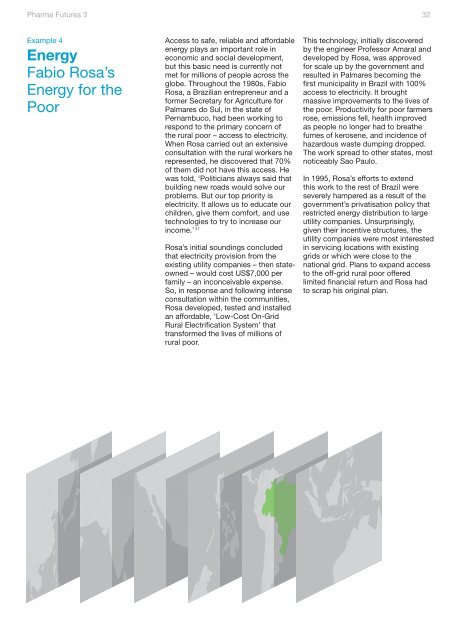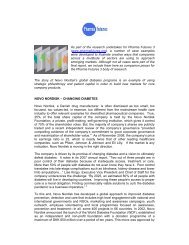Pharma Futures 3 Emerging Opportunities
Pharma Futures 3 Emerging Opportunities
Pharma Futures 3 Emerging Opportunities
You also want an ePaper? Increase the reach of your titles
YUMPU automatically turns print PDFs into web optimized ePapers that Google loves.
<strong>Pharma</strong> <strong>Futures</strong> 3<br />
Example 4<br />
Energy<br />
Fabio Rosa’s<br />
Energy for the<br />
Poor<br />
Access to safe, reliable and affordable<br />
energy plays an important role in<br />
economic and social development,<br />
but this basic need is currently not<br />
met for millions of people across the<br />
globe. Throughout the 1980s, Fabio<br />
Rosa, a Brazilian entrepreneur and a<br />
former Secretary for Agriculture for<br />
Palmares do Sul, in the state of<br />
Pernambuco, had been working to<br />
respond to the primary concern of<br />
the rural poor – access to electricity.<br />
When Rosa carried out an extensive<br />
consultation with the rural workers he<br />
represented, he discovered that 70%<br />
of them did not have this access. He<br />
was told, ‘Politicians always said that<br />
building new roads would solve our<br />
problems. But our top priority is<br />
electricity. It allows us to educate our<br />
children, give them comfort, and use<br />
technologies to try to increase our<br />
income.’ 37<br />
Rosa’s initial soundings concluded<br />
that electricity provision from the<br />
existing utility companies – then stateowned<br />
– would cost US$7,000 per<br />
family – an inconceivable expense.<br />
So, in response and following intense<br />
consultation within the communities,<br />
Rosa developed, tested and installed<br />
an affordable, ‘Low-Cost On-Grid<br />
Rural Electrification System’ that<br />
transformed the lives of millions of<br />
rural poor.<br />
32<br />
This technology, initially discovered<br />
by the engineer Professor Amaral and<br />
developed by Rosa, was approved<br />
for scale up by the government and<br />
resulted in Palmares becoming the<br />
first municipality in Brazil with 100%<br />
access to electricity. It brought<br />
massive improvements to the lives of<br />
the poor. Productivity for poor farmers<br />
rose, emissions fell, health improved<br />
as people no longer had to breathe<br />
fumes of kerosene, and incidence of<br />
hazardous waste dumping dropped.<br />
The work spread to other states, most<br />
noticeably Sao Paulo.<br />
In 1995, Rosa’s efforts to extend<br />
this work to the rest of Brazil were<br />
severely hampered as a result of the<br />
government’s privatisation policy that<br />
restricted energy distribution to large<br />
utility companies. Unsurprisingly,<br />
given their incentive structures, the<br />
utility companies were most interested<br />
in servicing locations with existing<br />
grids or which were close to the<br />
national grid. Plans to expand access<br />
to the off-grid rural poor offered<br />
limited financial return and Rosa had<br />
to scrap his original plan.



